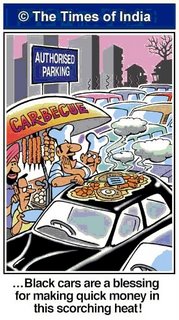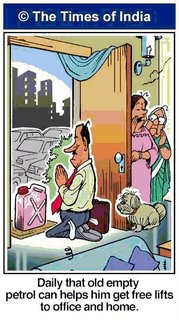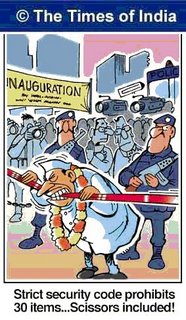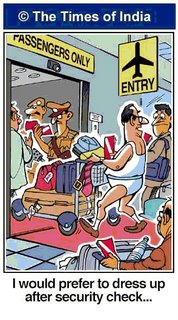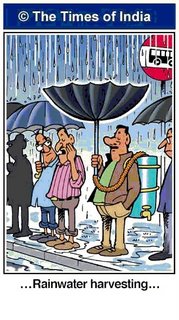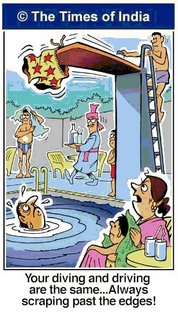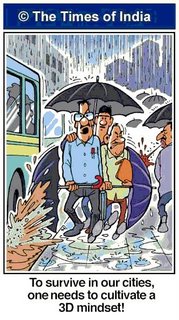Here is the full interview of Mr. Arjun Singh, HRD Minister, conducted by Mr. Karan Thapar. Please read on the whole interview to know how knowledgable our honorary ministers are.
Source : http://www.ibnlive.com/news/devils-advocate-arjun-singh/11063-4.html
Karan Thapar: Hello and welcome to the Devil's Advocate. As the debate over the reservations for the OBCs divides the country, we ask - What are the government's real intentions? That is the critical questions that I shall put today in an exclusive interview to the Minister for Human Resource Development Arjun Singh.
Most of the people would accept that steps are necessary to help the OBCs gain greater access to higher education.The real question is - Why do you believe that reservations is the best way of doing this?
Arjun Singh: I wouldn't like to say much more on this because these are decisions that are taken not by individuals alone. And in this case, the entire Parliament of this country - almost with rare anonymity - has decided to take this decision.
Karan Thapar: Except that Parliament is not infallible. In the Emergency, when it amended the Constitution, it was clearly wrong, it had to reverse its own amendments. So, the question arises - Why does Parliament believe that the reservation is the right way of helping the OBCs?
Arjun Singh: Nobody is infallible. But Parliament is Supreme and atleast I, as a Member of Parliament, cannot but accept the supremacy of Parliament.
Karan Thapar: No doubt Parliament is supreme, but the constitutional amendment that gives you your authorities actually unenabling amendment, it is not a compulsory requirement. Secondly, the language of the amendment does not talk about reservations, the language talks about any provision by law for advancement of socially and educationally backward classes. So, you could have chosen anything other than reservations, why reservations?
Arjun Singh: Because as I said, that was the 'will and desire of the Parliament'.
Karan Thapar: Do you personally also, as Minister of Human Resource Development , believe that reservations is the right and proper way to help the OBCs?
Arjun Singh: Certainly, that is one of the most important ways to do it.
Karan Thapar: The right way?
Arjun Singh: Also the right way.
Karan Thapar: In which case, lets ask a few basic questions; we are talking about the reservations for the OBCs in particular. Do you know what percentage of the Indian population is OBC? Mandal puts it at 52 per cent, the National Sample Survey Organisation at 32 per cent, the National Family and Health Survey at 29.8 per cent, which is the correct figure?
Arjun Singh: I think that should be decided by people who are more knowledgeable. But the point is that the OBCs form a fairly sizeable percentage of our population.
Karan Thapar: No doubt, but the reason why it is important to know 'what percentage' they form is that if you are going to have reservations for them, then you must know what percentage of the population they are, otherwise you don't know whether they are already adequately catered in higher educational institutions or not.
Arjun Singh: That is obvious - they are not.
Karan Thapar: Why is it obvious?
Arjun Singh: Obvious because it is something which we all see.
Karan Thapar: Except for the fact that the NSSO, which is a government appointed body, has actually in its research in 1999 - which is the most latest research shown - that 23.5 per cent of all university seats are already with the OBCs. And that is just 8.5 per cent less than what the NSSO believes is the OBC share of the population. So, for a difference of 8 per cent, would reservations be the right way of making up the difference?
Arjun Singh: I wouldn't like to go behind all this because, as I said, Parliament has taken a view and it has taken a decision, I am a servant of Parliament and I will only implement.
Karan Thapar: Absolutely, Parliament has taken a view, I grant it. But what people question is the simple fact - Is there a need for reservations? If you don't know what percentage of the country is OBC, and if furthermore, the NSSO is correct in pointing out that already 23.5 per cent of the college seats are with the OBC, then you don't have a case in terms of need.
Arjun Singh: College seats, I don't know.
Karan Thapar: According to the NSSO - which is a government appointed body - 23.5 per cent of the college seats are already with the OBCs.
Arjun Singh: What do you mean by college seats?
Karan Thapar: University seats, seats of higher education.
Arjun Singh: Well, I don't know I have not come across that far.
Karan Thapar: So, when critics say to you that you don't have a case for reservation in terms of need, what do you say to them?
Arjun Singh: I have said what I had to say and the point is that that is not an issue for us to now debate.
Karan Thapar: You mean the chapter is now closed?
Arjun Singh: The decision has been taken.
Karan Thapar: Regardless of whether there is a need or not, the decision is taken and it is a closed chapter.
Arjun Singh: So far as I can see, it is a closed chapter and that is why I have to implement what all Parliament has said.
Karan Thapar: Minister, it is not just in terms of 'need' that your critics question the decision to have reservation for OBCs in higher education. More importantly, they question whether reservations themselves are efficacious and can work. For example, a study done by the IITs themselves shows that 50 per cent of the IIT seats for the SCs and STs remain vacant and for the remaining 50 per cent, 25 per cent are the candidates, who even after six years fail to get their degrees. So, clearly, in their case, reservations are not working.
Arjun Singh: I would only say that on this issue, it would not be correct to go by all these figures that have been paraded.
Karan Thapar: You mean the IIT figures themselves could be dubious?
Arjun Singh: Not dubious, but I think that is not the last word.
Karan Thapar: All right, maybe the IIT may not be the last word, let me then quote to you the report of the Parliamentary Committee on the welfare for the Scheduled Castes and Scheduled Tribes - that is a Parliamentary body.
It says that looking at the Delhi University, between 1995 and 2000, just half the seats for under-graduates at the Scheduled Castes level and just one-third of the seats for under-graduates at the Scheduled Tribes level were filled. All the others went empty, unfilled. So, again, even in Delhi University, reservations are not working.
Arjun Singh: If they are not working, it does not mean that for that reason we don't need them. There must be some other reason why they are not working and that can be certainly probed and examined. But to say that for this reason, 'no reservations need to be done' is not correct.
Karan Thapar: Fifty years after the reservations were made, statistics show, according to The Hindustan Times, that overall in India, only 16 per cent of the places in higher education are occupied by SCs and STs. The quota is 22.5 per cent, which means that only two-thirds of the quota is occupied. One third is going waste, it is being denied to other people.
Arjun Singh: As I said, the kind of figures that have been brought out, in my perception, do not reflect the realities. Realities are something much more and of course, there is an element of prejudice also.
Karan Thapar: But these are figures that come from a Parliamentary Committee. It can't be prejudiced; they are your own colleagues.
Arjun Singh: Parliamentary Committee has given the figures, but as to why this has not happened, that is a different matter.
Karan Thapar: I put it to you that you don't have a case for reservations in terms of need, you don't have a case for reservations in terms of their efficacy, why then, are you insisting on extending them to the OBCs?
Arjun Singh: I don't want to use that word, but I think that your argument is basically fallicious.
Karan Thapar: But it is based on all the facts available in the public domain.
Arjun Singh: Those are facts that need to be gone into with more care. What lies behind those facts, why this has not happened, that is also a fact.
Karan Thapar: Let's approach the issue of reservations differently in that case. Reservations mean that a lesser-qualified candidate gets preference over a more qualified candidate, solely because in this case, he or she happens to be an OBC. In other words, the upper castes are being penalised for being upper caste.
Arjun Singh: Nobody is being penalised and that is a factor that we are trying to address. I think that the prime Minister will be talking to all the political parties and will be putting forward a formula, which will see that nobody is being penalised.
Karan Thapar: I want very much to talk about that formula, but before we come to talk about how you are going to address concerns, let me point one other corollary - Reservations also gives preference and favour to caste over merit. Is that acceptable in a modern society?
Arjun Singh: I don't think the perceptions of modern society fit India entirely.
Karan Thapar: You mean India is not a modern society and therefore can't claim to be treated as one?
Arjun Singh: It is emerging as a modern society, but the parameters of a modern society do not apply to large sections of the people in this country.
Karan Thapar: Let me quote to you Jawaharlal Nehru, a man whom you personally admire enormously. On the 27th of June 1961 wrote to the Chief Ministers of the day as follows: I dislike any kind of reservations. If we go in for any kind of reservations on communal and caste basis, we will swamp the bright and able people and remain second rate or third rate. The moment we encourage the second rate, we are lost. And then he adds pointedly: This way lies not only folly, but also disaster. What do you say to Jawaharlal Nehru today?
Arjun Singh: Jawaharlal Nehru was a great man in his own right and not only me, but everyone in India accept his view.
Karan Thapar: But you are just about to ignore his advice.
Arjun Singh: No. Are you aware that it was Jawaharlal Nehru who introduced the first ammendment regarding OBCs?
Karan Thapar: Yes, and I am talking about Jawaharlal Nehru in 1961, when clearly he had changed his position, he said - I dislike any kind of reservations.
Arjun Singh: I don't think one could take Panditji's position at any point of time and then overlook what he had himself initiated.
Karan Thapar: Am I then to understand that regardless of the case that is made against reservations in terms of need, regardless of the case that has been made against reservations in terms of efficacy, regardless of the case that has been made against reservations in terms of Jawaharlal Nehru, you remain committed to extending reservations to the OBCs.
Arjun Singh: I said because that is the will of Parliament. And I think that common decisions that are taken by Parliament have to be honoured.
Karan Thapar: Let me ask you a few basic questions - If reservations are going to happen for the OBCs in higher education, what percentage of reservations are we talking about?
Arjun Singh: No, that I can't say because that has yet to be decided.
Karan Thapar: Could it be less than 27 per cent?
Arjun Singh: I can't say anything on that, I have told you in the very beginning that at this point of time it is not possible for me to.
Karan Thapar: Quite right. If you can't say, then that also means that the figure has not been decided.
Arjun Singh: The figure will be decided, it has not been decided yet.
Karan Thapar: The figure has not been decided. So, therefore the figure could be 27, but it could be less than 27 too?
Arjun Singh: I don't want to speculate on that because as I said, that is decision, which will be taken by Parliament.
Karan Thapar: Whatever the figure, one thing is certain that when the reservations for OBCs happen, the total quantum of reservations will go up in percentage terms. Will you compensate by increasing the total number of seats in colleges, universities, IITs and IIMs, so that the other students don't feel deprived.
Arjun Singh: That is one of the suggestions that has been made and is being seriously considered.
Karan Thapar: Does it find favour with you as a Minister for Human Resource Development?
Arjun Singh: Whatever suggestion comes, we are committed to examine it.
Karan Thapar: You may be committed to examine it, but do you as minister believe that that is the right way forward?
Arjun Singh: That could be one of the ways, but not the only way.
Karan Thapar: What are the other ways?
Arjun Singh: I don't know. That is for the Prime Minister and the other ministers to decide.
Karan Thapar: One way forward would be to increase the total number of seats.
Arjun Singh: Yes, definitely.
Karan Thapar: But the problem is that as the Times of India points out, we are talking of an increase of perhaps as much as 53 per cent. Given the constraints you have in terms of faculty and infrastructure, won't that order of increase dilute the quality of education?
Arjun Singh: I would only make one humble request, don't go by The Times of India and The Hindustan Times about faculty and infrastructure, because they are trying to focus on an argument which they have made.
Karan Thapar: All right, I will not go by The Times of India, let me instead go by Sukhdev Thorat, the Chairman of the UGC. He points out that today, at higher education levels - that is all universities, IITs and IIMs - there is already a 1.2 lakh vacancy number. 40 per cent of these are in teaching staff, which the IIT faculty themselves point out that they have shortages of up to 30 per cent. Given those two constraint, can you increase the number of seats?
Arjun Singh: That can be addressed and that shortage can be taken care of.
Karan Thapar: But it can't be taken care of in one swoop, it will take several years to do it.
Arjun Singh: I don't know whether it can be taken care of straightway or in stages, that is a subject to be decided.
Karan Thapar: Let me ask you bluntly, if you were to agree to compensate for reservations for OBCs by increasing the number of seats, would that increase happen at one go, or would it be staggered over a period of two-three or four year old process.
Arjun Singh: As I told you, it is an issue that I cannot comment upon at this moment because that is under examination.
Karan Thapar: So, it may happen in one go and it may happen in a series of several years.
Arjun Singh: I can't speculate on that because that is not something on which I am free to speak on today.
Karan Thapar: Will the reservation for OBCs, whatever figure your Committee decides on, will it happen in one go, or will it slowly be introduced in stages?
Arjun Singh: That also I cannot say because as I told you, all these issues are under consideration.
Karan Thapar: Which means that everything that is of germane interest to the people concerned is at the moment 'under consideration' and the government is not able to give any satisfaction to the students who are deeply concerned.
Arjun Singh: That is not the point. The government knows what to do and it will do what is needed.
Karan Thapar: But if the government knows what to do, why won't you tell me what the government wants to do?
Arjun Singh: Because unless the decision is taken, I cannot tell you.
Karan Thapar: But you can share with me as the Minister what you are thinking.
Arjun Singh: No.
Karan Thapar: So, in other words, we are manitaining a veil of secrecy and the very people who are concerned...
Arjun Singh: I am not maintaining a veil of secrecy. I am only telling you what propriety allows me to tell you.
Karan Thapar: Propriety does not allow you to share with the people who are protesting on the streets what you are thinking?
Arjun Singh: I don't think that that can happen all the time.
Karan Thapar: But there are people who feel that their lives and their futures are at stake and they are undertaking fasts until death.
Arjun Singh: It is being hyped up, I don't want to go into that.
Karan Thapar: Do you have no sympathy for them?
Arjun Singh: I have every sympathy.
Karan Thapar: But you say it is being hyped up.
Arjun Singh: Yes, it is hyped up.
Karan Thapar: So, then, what sympathy are you showing?
Arjun Singh: I am showing sympathy to them and not to those who are hyping it up.
Karan Thapar: The CPM says that if the reservations for the OBCs are to happen, then what is called the creamy layer should be excluded. How do you react to that?
Arjun Singh: The creamy layer issue has already been taken care of by the Supreme Court.
Karan Thapar: That was vis -a-vis jobs in employment, what about at the university level, should they be excluded there as well because you are suggesting that the answer is yes?
Arjun Singh: That could be possible.
Karan Thapar: It could be possible that the creamy layer is excluded from reservations for OBCs in higher education?
Arjun Singh: It could be, but I don't know whether it would happen actually.
Karan Thapar: Many people say that if reservations for OBCs in higher education happen, then the children of beneficiaries should not be entitled to claim the same benefit.
Arjun Singh: Why?
Karan Thapar: So that there is always a shrinking base and the rate doesn't proliferate.
Arjun Singh: I don't think that that is a very logical way of looking at it.
Karan Thapar: Is that not acceptable to you?
Arjun Singh: No, it is not the logical way of looking at it.
Karan Thapar: So, with the possible exception of the creamy layer exclusion, reservation for OBCs in higher education will be almost identical to the existing reservations for SC/STs?
Arjun Singh: Except for the percentage.
Karan Thapar: Except for the percentage.
Arjun Singh: Yes.
Karan Thapar: So, in every other way, they will be identical.
Arjun Singh: Yes, in every other way.
Karan Thapar: Mr Arjun Singh, on the 5th of April when you first indicated that the Government was considering reservation for OBCs in higher education, was the Prime Minister in agreement that this was the right thing to do?
Arjun Singh: I think, there is a very motivated propaganda is on this issue. Providing reservation to OBCs was in the public domain right from December 2005, when Parliament passed the enabling resolution.
Karan Thapar: Quite true. But had the Prime Minister specifically agreed on or before 5th of April to the idea?
Arjun Singh: Well, I am telling you it was already there. A whole Act was made, the Constitution was amended and the Prime Minister was fully aware of what this is going to mean. Actually, he had a meeting in which OBC leaders were called to convince them that this would give them the desired advantage. And they should, therefore, support this resolution. And at that meeting, he himself talked to them. Now, how do you say that he was unaware?
Karan Thapar: But were you at all aware that the Prime Minister might be in agreement with what was about to happen but might not wish it disclosed publicly at that point of time? Were you aware of that?
Arjun Singh: It was already there in public domain, that's what I am trying to tell you.
Karan Thapar: Then answer this to me. Why are members of the PMO telling journalists that Prime Minister was not consulted and that you jumped the gun?
Arjun Singh: Well, I don't know which member of the PMO you are talking about unless you name him.
Karan Thapar: Is there a conspiracy to make you the fall guy?
Arjun Singh: Well, I don't know whether there is one or there is not. But fall guys are not made in this way. And I am only doing what was manifestly clear to every one, was cleared by the party and the Prime Minister. There is no question of any personal agenda.
Karan Thapar: They say that, in fact, you brought up this issue to embarrass the Prime Minister.
Arjun Singh: Why should I embarrass the Prime Minister? I am with him. I am part of his team.
Karan Thapar: They say that you have a lingering, forgive the word, jealousy because Sonia Gandhi chose Manmohan Singh and not you as Prime Minister.
Arjun Singh: Well, that is canard which is below contempt. Only that person can say this who doesn't know what kind of respect and regard I hold for Sonia Gandhi. She is the leader. Whatever she decides is acceptable to me.
Karan Thapar: They also say that you brought this issue up because you felt that the Prime Minister had been eating into your portfolio. Part of it had gone to Renuka Chaudhury and, in fact, your new deputy minister Purandar Sridevi had taken over certain parts. This was your way of getting back.
Arjun Singh: No one was taking over any part. This is a decision which the Prime Minister makes as to who has to have what portfolio. And he asked Mrs Renuka Devi to take it and he cleared it with me first.
Karan Thapar: So there is no animus on your part?
Arjun Singh: Absolutely not.
Karan Thapar: They say that you did this because you resented the Prime Minister's popular image in the country, that this was your way of embroiling him in a dispute that will make him look not like a modern reformer but like an old-fashioned, family-hold politician instead.
Arjun Singh: Well, the Tammany Hall political stage is over> He is our Prime Minister and every decision he has taken is in the full consent with his Cabinet and I don't think there can be any blame on him.
Karan Thapar: One, then, last quick question. Do you think this is an issue, which is a sensitive issue, where everyone knew there would have been passions and emotions that would have aroused has been handled as effectively as it should have been?
Arjun Singh: Well, I have not done anything on it. I have not sort of what you call jumped the gun. If this is an issue, which is sensitive, everyone has to treat it that way.
Karan Thapar: But your conscience as HRD Minister is clear?
Arjun Singh: Absolutely clear.
Karan Thapar: There is nothing that you could have done to make it easier for the young students?
Arjun Singh: Well, I am prepared to do anything that can be done. And it is being attempted.
Karan Thapar: For seven weeks, they have been protesting in the hot sun. No minister has gone there to appease them, to alley their concerns, to express sympathy for them. Have politicians let the young people of India down?
Arjun Singh: Well, I myself called them. They all came in this very room.
Karan Thapar: But you are the only one.
Arjun Singh: You are accusing me only. No one else is being accused.
Karan Thapar: What about the Government of India? Has the Government of India failed to respond adequately?
Arjun Singh: From the Government of India also, the Defence Minister met them.
Karan Thapar: Only recently.
Arjun Singh: That is something because everyone was busy with the elections.
Karan Thapar: For seven weeks no one met them.
Arjun Singh: No, but we are very concerned. Certainly, all of us resent the kind of force that was used. I condemned it the very first day it happened.
Karan Thapar: All right, Mr Arjun Singh. We have reached the end of this interview. Thank you very much for speaking on the subject
